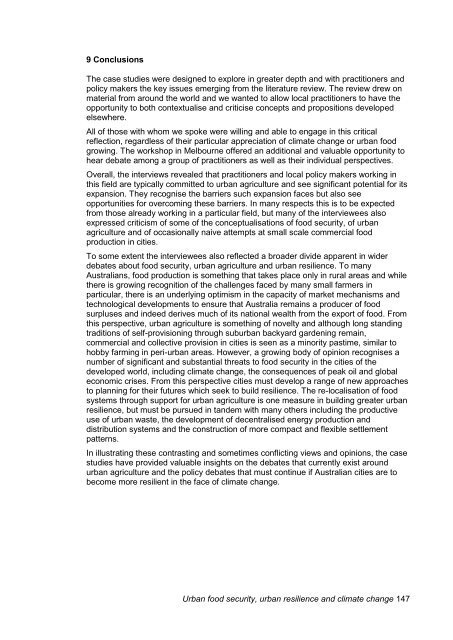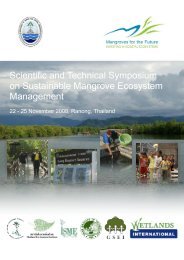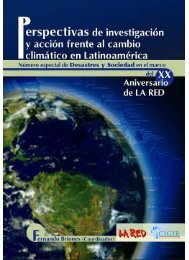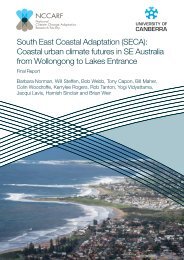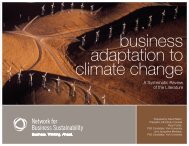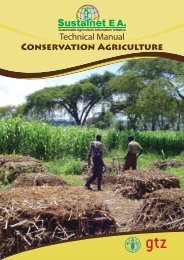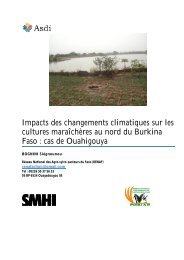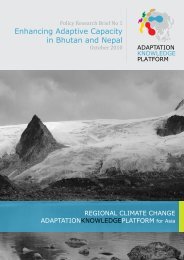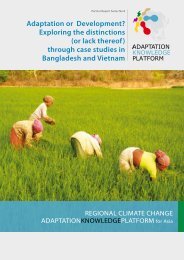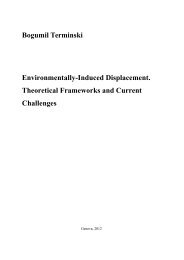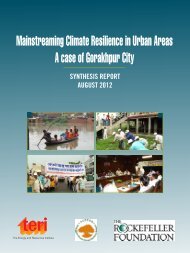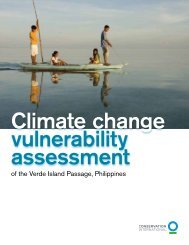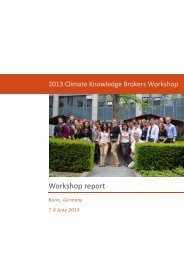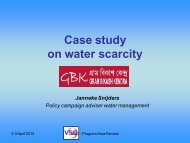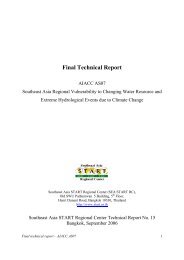9 ConclusionsThe case studies were designed to explore in greater depth <strong>and</strong> with practitioners <strong>and</strong>policy makers the key issues emerging from the literature review. The review drew onmaterial from around the world <strong>and</strong> we wanted to allow local practitioners to have theopportunity to both contextualise <strong>and</strong> criticise concepts <strong>and</strong> propositions developedelsewhere.All of those with whom we spoke were willing <strong>and</strong> able to engage in this criticalreflection, regardless of their particular appreciation of <strong>climate</strong> <strong>change</strong> or <strong>urban</strong> <strong>food</strong>growing. The workshop in Melbourne offered an additional <strong>and</strong> valuable opportunity tohear debate among a group of practitioners as well as their individual perspectives.Overall, the interviews revealed that practitioners <strong>and</strong> local policy makers working inthis field are typically committed to <strong>urban</strong> agriculture <strong>and</strong> see significant potential for itsexpansion. They recognise the barriers such expansion faces but also seeopportunities for overcoming these barriers. In many respects this is to be expectedfrom those already working in a particular field, but many of the interviewees alsoexpressed criticism of some of the conceptualisations of <strong>food</strong> <strong>security</strong>, of <strong>urban</strong>agriculture <strong>and</strong> of occasionally naive attempts at small scale commercial <strong>food</strong>production in cities.To some extent the interviewees also reflected a broader divide apparent in widerdebates about <strong>food</strong> <strong>security</strong>, <strong>urban</strong> agriculture <strong>and</strong> <strong>urban</strong> <strong>resilience</strong>. To manyAustralians, <strong>food</strong> production is something that takes place only in rural areas <strong>and</strong> whilethere is growing recognition of the challenges faced by many small farmers inparticular, there is an underlying optimism in the capacity of market mechanisms <strong>and</strong>technological developments to ensure that Australia remains a producer of <strong>food</strong>surpluses <strong>and</strong> indeed derives much of its national wealth from the export of <strong>food</strong>. Fromthis perspective, <strong>urban</strong> agriculture is something of novelty <strong>and</strong> although long st<strong>and</strong>ingtraditions of self-provisioning through sub<strong>urban</strong> backyard gardening remain,commercial <strong>and</strong> collective provision in cities is seen as a minority pastime, similar tohobby farming in peri-<strong>urban</strong> areas. However, a growing body of opinion recognises anumber of significant <strong>and</strong> substantial threats to <strong>food</strong> <strong>security</strong> in the cities of thedeveloped world, including <strong>climate</strong> <strong>change</strong>, the consequences of peak oil <strong>and</strong> globaleconomic crises. From this perspective cities must develop a range of new approachesto planning for their futures which seek to build <strong>resilience</strong>. The re-localisation of <strong>food</strong>systems through support for <strong>urban</strong> agriculture is one measure in building greater <strong>urban</strong><strong>resilience</strong>, but must be pursued in t<strong>and</strong>em with many others including the productiveuse of <strong>urban</strong> waste, the development of decentralised energy production <strong>and</strong>distribution systems <strong>and</strong> the construction of more compact <strong>and</strong> flexible settlementpatterns.In illustrating these contrasting <strong>and</strong> sometimes conflicting views <strong>and</strong> opinions, the casestudies have provided valuable insights on the debates that currently exist around<strong>urban</strong> agriculture <strong>and</strong> the policy debates that must continue if Australian cities are tobecome more resilient in the face of <strong>climate</strong> <strong>change</strong>.<strong>Urban</strong> <strong>food</strong> <strong>security</strong>, <strong>urban</strong> <strong>resilience</strong> <strong>and</strong> <strong>climate</strong> <strong>change</strong> 147
BIBLIOGRAPHYAECOM (2011) Scoping Study for Local Food Production <strong>and</strong> Purchase on the Gold Coast,prepared for the Gold Coast City Council, Queensl<strong>and</strong>, Australia.Altieri, M. A., & Koohafkan, P. (2008). Enduring Farms: Climate Change, Smallholders <strong>and</strong>Traditional Farming Communities. Penang, Malaysia: Third World Network.Anderson, M. D. C., J. T. (1999). Community Food Security: Practice in Need of Theory?Agriculture <strong>and</strong> Human Values, 16, 141-150.Andrée, P., Dibden, J., Higgins, V., & Cocklin, C. (2010). Competitive Productivism <strong>and</strong>Australia's Emerging ‘Alternative’ Agri-<strong>food</strong> Networks: producing for farmers' markets inVictoria <strong>and</strong> beyond. Australian Geographer, 41(3), 307-322.Anglicare Australia (2012) When there’s not enough to eat: a national study of <strong>food</strong> in<strong>security</strong>among Emergency Relief clients, Ainslie, ACT: Anglicare AustraliaArmar-Klemesu, M. (2001). <strong>Urban</strong> Agriculture <strong>and</strong> Food Security, Nutrition <strong>and</strong> Health. In N. D.Bakker, M; Guendel, S; Sabel Koscella, U; de Zeeuw, H (Ed.), Growing Cities, GrowingFood: <strong>Urban</strong> Agriculture on the Policy Agenda: A Reader on <strong>Urban</strong> Agriculture (pp. 99-117). Feldefing, Germany: Deutsche Stiftung für Internationale Entwicklung (DSE).Australian Competition <strong>and</strong> Consumer Commission (2008) Report of the ACCC inquiry into thecompetitiveness of retail prices for st<strong>and</strong>ard groceries, Canberra: ACCCAustralian Government (2011a). Australian Food Statistics 2009-10. Canberra: Retrieved fromhttp://www.daff.gov.au/agriculture<strong>food</strong>/<strong>food</strong>/publications/afs/australian_<strong>food</strong>_statistics_2009.Australian Government (2011b). Issues Paper to Inform Development of a National Food Plan.Canberra: Retrieved from www.daff.gov.au/nfp.Baker, L. Campsie P <strong>and</strong> Rabinowicz K (2010) Menu 2020: Ten Good Food Ideas for Ontario,Toronto: George Cedric Metcalf Charitable FoundationBambrick, H. J., Capon, A. G., Barnett, G. B., Beaty, R. M., & Burton, A. J. (2011). Climate<strong>change</strong> <strong>and</strong> health in the <strong>urban</strong> environment: adaptation opportunities in Australiancities. Asia Pacific Journal of Public Health, 23(2 Suppl), 67S-79.Barling, D. <strong>and</strong> Lang, T. (2005) Trading on health: Cross-continental production <strong>and</strong>consumption tensions <strong>and</strong> the governance of international <strong>food</strong> st<strong>and</strong>ards, in Fold, N.<strong>and</strong> Pritchard, B. (eds) Cross-continental Food Chains, Routledge, London, pp. 39-51.Barr, S., Gilg, A., & Shaw, G. (2011). Citizens, consumers <strong>and</strong> sustainability: (Re)Framingenvironmental practice in an age of <strong>climate</strong> <strong>change</strong>. Global Environmental Change,21(4), 1224-1233.Bartling, H. (2012) A chicken ain't nothin' but a bird: local <strong>food</strong> production <strong>and</strong> politics of l<strong>and</strong>use <strong>change</strong>, Local Environment, vol 17, no 1, 23-34Beaulac, J., Kristjansson, E., Cummins, S. (2009) A systematic review of <strong>food</strong> deserts, 1966-2007, Preventing Chronic Disease, 6(3) 1-10<strong>Urban</strong> <strong>food</strong> <strong>security</strong>, <strong>urban</strong> <strong>resilience</strong> <strong>and</strong> <strong>climate</strong> <strong>change</strong> 148
- Page 1 and 2:
Synthesis and Integrative ResearchF
- Page 3 and 4:
Published by the National Climate C
- Page 5 and 6:
ABSTRACTFood security is increasing
- Page 7 and 8:
1. a review of the literature: on n
- Page 9 and 10:
its Food for All project. This help
- Page 13 and 14:
In response to the existential thre
- Page 15 and 16:
2. OBJECTIVES OF THE RESEARCHFood i
- Page 17 and 18:
debates and to the more systematic
- Page 19 and 20:
organisation in the past few years.
- Page 21 and 22:
4. RESULTSIn this section we presen
- Page 23 and 24:
increasing productivity. Thus, whil
- Page 25 and 26:
people and the origins of their foo
- Page 27 and 28:
urban food supply chains. Thus, whi
- Page 29 and 30:
This logistics system is dominated
- Page 31 and 32:
Like Hodgson et al., as per definit
- Page 33 and 34:
esilient, powerful by being locally
- Page 35 and 36:
volume or even its contribution to
- Page 37:
community food growing can have on
- Page 40 and 41:
generations this history has been f
- Page 42 and 43:
a stronger focus on addressing the
- Page 44 and 45:
The third key aspect is fairness -
- Page 46 and 47:
climate (which we live and work in
- Page 48 and 49:
agriculture. Eight percent is in ur
- Page 50 and 51:
This concept of the ‘spaces in be
- Page 52 and 53:
esearch scientist and chair of the
- Page 54 and 55:
As discussed above, protection of t
- Page 56:
4.2.5 What is the extent and the im
- Page 60 and 61:
no place under the panoply of pract
- Page 62 and 63:
increased, the market dominance of
- Page 64 and 65:
… the residents of S Park called
- Page 66 and 67:
5. CONCLUSIONSThere is growing conc
- Page 68 and 69:
urban resilience. This inevitably c
- Page 70 and 71:
In many respects these contrasting
- Page 72 and 73:
Many interviewees of both standpoin
- Page 74 and 75:
a given area. The rationale for thi
- Page 76 and 77:
mapping the location of sources of
- Page 78 and 79:
Australian food policy debates refl
- Page 80 and 81:
APPENDIX 1: URBAN FOOD SECURITY, UR
- Page 82 and 83:
IntroductionGlobally, and in Austra
- Page 84 and 85:
Review methodsThis stage of the res
- Page 86 and 87:
despite many of the causes of food
- Page 88 and 89:
…by 2050… food production will
- Page 90 and 91:
2. How is food security (in general
- Page 92 and 93:
the food security of cities, but no
- Page 94 and 95:
While some see the density of devel
- Page 96 and 97:
when suppliers, distributors, and c
- Page 98 and 99:
a more prominent role in enhancing
- Page 100 and 101:
community gardens webpage on the Co
- Page 102 and 103:
comprehensive description of the ca
- Page 104 and 105:
In both the developed and developin
- Page 106 and 107: Their review notes a significant in
- Page 108 and 109: lines of supply from often rural pl
- Page 110 and 111: 1 IntroductionCities have always be
- Page 112 and 113: Despite some attempts to curb urban
- Page 114 and 115: the Gold Coast remains a city that
- Page 116 and 117: ackyard/community gardenernot affil
- Page 118 and 119: level in local government. VicHealt
- Page 120: Figure 2: Impacts on Municipal Food
- Page 125 and 126: security I recognise that the cost
- Page 127 and 128: United States, he offered the follo
- Page 129 and 130: This vision highlights the multi-fu
- Page 131 and 132: An environmental education centre.
- Page 133 and 134: Melbourne Food ForestA Melbourne ga
- Page 135 and 136: stakeholder consultations, the repo
- Page 137 and 138: can. We sense the changes. The earl
- Page 139 and 140: half-desert environments. We’re g
- Page 141 and 142: etain its basic function and struct
- Page 143 and 144: government; and that trying to get
- Page 145 and 146: the north and the west, where it wo
- Page 147 and 148: Why do people buy so much food that
- Page 149 and 150: urban agriculture (however broadly
- Page 151 and 152: enefits and risks. Before we can co
- Page 153 and 154: Another important and tangible role
- Page 155: coast without any problems whatsoev
- Page 159 and 160: Burns, C. I., A. (2007). Measuring
- Page 161 and 162: Edwards, F., & Mercer, D. (2010). M
- Page 163 and 164: James, S. O’Neill, P. and Dimeski
- Page 165 and 166: Millar, R., 2012, ‘Government shi
- Page 167 and 168: Saltmarsh, N. M., J; Longhurst, N.
- Page 169 and 170: Walker B., 2008, Resilience Thinkin


